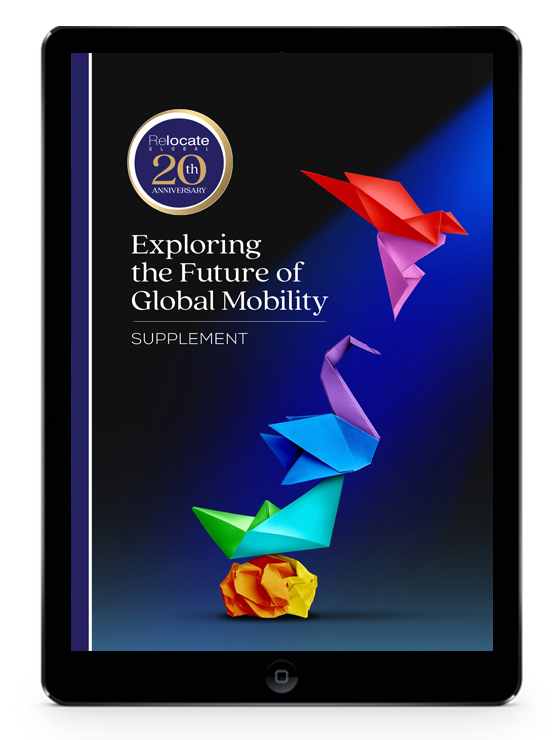How to avoid the legal and financial pitfalls of remote working and overseas assignments
Managing disparate teams in multiple global locations can be tricky, says Marianne Curphey. Discover how to navigate a safe passage for employers and employees.
To an employee, the right to work remotely from anywhere in the world may seem like a simple request. For the employer, however, it can be fraught with legal and tax repercussions. Yet if you can offer flexibility, your employees will see it as a significant perk. We look at the challenges and opportunities that come with hybrid working on a global scale. Businesses are looking overseas to source labour, due to a shortage of talent in their home markets. Of those that have taken on labour from outside the UK due to staffing challenges, over half (52%) have increased the amount of overseas labour that they have taken on in the last year, according to a report by RSM UK. The vast majority (79%) of these international workers have been sourced from the EU.
Since Covid there has been a backlog in processing visa applications and work permits. Companies may not be able to send staff as soon as they would like, which can lead to frustration and delayed relocation plans. “It is clear businesses recognise the importance of offering flexible working to attract and retain employees, and the pandemic has proved that this new way of working is possible, depending on the sector and role,” says Joanne Webber, global employer services partner at RSM UK.
“Allowing employees to work overseas may seem like a great benefit, but often both employers and employees don’t fully understand what they are signing up for, and they could be entering a tax minefield.”
How far should employers go to help staff work remotely?
Beverley Sunderland, managing director of Crossland Employment Solicitors, specialises in employment law. She says that while organisations are trying their best to accommodate requests from staff to work remotely or away from head office, the process can be more difficult and time-consuming than they expected.
“Just to get a work permit is not necessarily as easy as it might sound,” she says. “If you are sending a member of staff abroad to live and work, you have to issue a completely separate contract, which must cover repatriation, how the employee will be paid and in which currency, and whether the employer will pay for flights home and how often.
“This is a legal requirement under Section One of the Employment Rights Act, which requires employers to have a detailed contract for employees who are being sent abroad.”She explains that you will need to look at the contract of employment because if there is any intention that the employee will have to spend more than two months of the year outside of the UK, then that needs to be written in.“One client shortly after the pandemic had a very senior employee who announced that they had moved to the Republic of Ireland and wanted to work from there. That caused all sorts of problems, not least because they wanted to be paid in euros and there was no facility to pay them.
“We had to engage with Irish lawyers to ascertain what rights the employee had and draw up an Irish contract to comply with the law. The clients had to take advice on that, all of which costs money.”
Outsourcing labour overseas to cut costs could be problematic in some cases
Indeed, businesses that are allowing employees to work flexibly overseas could find themselves in hot water if they are not aware of the tax requirements, says Joanne Webber of RSM UK.According to RSM UK’s latest ‘The Real Economy Report’, a third (33%) of businesses have allowed existing employees to work remotely outside of the UK in response to staffing challenges.
Labour shortages are being felt across the board, with well over three-quarters (88%) of businesses finding employee turnover a challenge. Of those that have offered hybrid working options to attract or retain employees, 31% of businesses have set restrictions on the length of time employees can work abroad.
While this suggests that some businesses are considering the tax risks associated with working overseas, it also raises concerns over the two-thirds of businesses with no restrictions in place that are perhaps less aware of the tax implications.
There are other pitfalls for employers, including their obligations around employment law, social security, cyber security and immigration rules.
For example, one area that can be easily overlooked when a UK employee works abroad is the individual could trigger a corporate presence (permanent establishment) for the UK company in that country, meaning the business may be subject to corporate tax and associated administration.“Current labour shortages are a real concern for businesses, so looking overseas may be their only option,” says Joanne Webber.“Hiring employees from outside the UK and allowing them to work from overseas won’t necessarily be a simple fix to labour shortages, as it will trigger the same risks that apply when allowing UK employees to work abroad.”There will be different tax rules depending on the country an individual chooses to work from, so employers venturing into ‘work for anywhere’ arrangements need to set parameters for staff and have a clear company policy in place, so everyone understands the risks, she says.
Beverley Sunderland warns that employers run the risk that whatever country their staff are living in, the employee may be required to pay tax. The foreign country may also decide to start taxing the profits of the employer, even though the company is based in the UK.
“If the person who has relocated is quite senior and is significantly contributing to the business and driving the company forward, the tax authorities could make that connection,” she says. “Each individual right at the start needs to take advice in each individual country to see what is available to them, whether there are double taxation, tax treaties or digital nomad schemes in place and understand what the implications are. This can be a significant burden for the employer to sort out.”
Getting to grips with the intricacies of employment law overseas
There are differences between an employee voluntarily moving to another country and the company sending an employee to work in a different location. Employers face challenges when their employees relocate, as they may gain additional rights and protections under the laws of the country they are working in.
Beverley explains that when an employee works in a foreign country, they may be covered by the employment laws of that country, even if they are employed by a company from their home country.
She says it can be both difficult and expensive to end employment contracts for employees from these countries. In addition, tax implications arise when employees work in foreign countries, potentially leading to the individual and the employer being subject to taxation in the host country.
There is the thorny issue of data protection. As well as GDPR, which is a regulation in EU law on data protection and privacy in the EU and the European Economic Area, separate countries have their own privacy rules. Employers need to check what the data protection requirements are for specific jurisdictions.
“For example, Spain has a rule that no personal data is to be exported from Spain to another country,” Beverley explains. “If you have an employee living and working in Spain, and they’re trying to communicate with the main office back in the UK with their personal data, that can be fraught with difficulties. While employees think they can just work from home wherever they want, it is not that easy for the employer.”
Employers may consider using fixed-term contracts as a solution for flexibility and cost-cutting. However, they need to be aware that after a certain period, fixed-term employees gain employment rights and should be treated fairly. There is legislation that protects fixed-term employees from being paid less or facing less favourable treatment compared to permanent employees.
Working abroad and the employer duty of care requirements
The duty of care of an employer includes providing a safe working environment. When employees work in foreign countries, additional considerations must be taken to ensure their safety, including risk assessments, security measures, and briefings.If an employer fails to provide a safe working environment and an employee gets injured or experiences harm, the employee can claim negligence against the employer. This can lead to legal repercussions and potential financial liability for the employer.
Employers could be liable for negligence if they do not provide a safe place of work, and they need to ensure they have employee liability insurance. She says employers need to be aware of the concept of vicarious liability, which holds employers responsible for the actions of their employees.
Remote working can be a tool for purpose and retention
Despite the challenges involved in accommodating different employee requests, being able to offer flexible and remote working can set your organisation apart from rivals.
Hanna Marie Asmussen, co-founder and CEO of Localyze, which helps people from more than 100 countries obtain visas, says that flexibility has been a key driver of employee satisfaction, especially after the pandemic-triggered move away from the office.
“In my view, flexibility is another word for agency – people want to have more control of their time and have their work align with their personal goals,” she says.
“As travel restrictions have eased, the latest frontier of flexibility has become the move to a more mobile world of work,” she says. “Not just remote, but global. We see more people wanting to relocate for a better opportunity, pursue a workcation (an extended vacation where they work temporarily from a different country), or take up more business trips. In other words, people want their workplace to give them opportunities to travel more freely outside the traditional vacation trip.”For any type of movement abroad, whether it is a relocation, a workcation, or a business trip, organisations need to actively communicate their policy on what is safe for both the business and its people, she says. Policies have the bad reputation of limiting flexibility, but in the context of global mobility, they are what turns global working into a sustainable and functioning programme, as long as they establish clear expectations on what both sides need to do.
“For example, a good policy should make it clear where employees can move for work, how long the trip can last before tax and payroll come into the discussion, and what process they should follow to share their request,” she explains.
The policy also needs to document the organisation’s responsibilities. For example, how the HR team will educate employees on health and safety, what support they will provide in case of emergencies, and how (or if) they will support in obtaining visas, insurance, and other details on a case-by-case basis.“Employees trade in a different precious resource: their time,” she says. “What inspires them to invest it with you is a clear vision of why you do what you do, and how results align with their values. Compensation and benefits are an attractive perk, but one everyone can replicate – a solid identity and company purpose are much harder to copy.”
Providing opportunities for employees to advance their career with overseas experience
While it may be challenging for companies to accommodate myriad requests, research shows that staff really value the opportunity to enhance their career through foreign assignments.
Liz Sebag-Montefiore is a coach and the director and co-founder of 10Eighty, an HR solutions consultancy. She says that employee recognition drives engagement and strengthens connections between people and across the organisation.
“Employees who find purpose at work are more productive than those who don’t,” she says. “You need an employee-centred approach that provides you with a line of sight to employee purpose, perspective and aspiration. The big win is that in encouraging employee purpose, you set up a positive feedback loop and improve outcomes not only in the wellbeing of the workforce, but also organisational performance.
”What makes employees feel valued? Recognition, appreciation, opportunity, being heard, and constructive and timely feedback. In order to balance corporate concerns with flexible working employers need to be reasonable, be seen to be fair and find ways to make accommodations that will work for employer and employee.
Related reading from our sister website Relocate Global
- What your staff want you to know about remote working
- Women professionals get hybrid working boost
- The Flex Factor: a dynamic approach to global mobility policy

Join Think Global People
Our exclusive membership network for decision-makers, aspiring leaders, experts and thought leaders focused on global business and working.



 Magazine
Magazine



